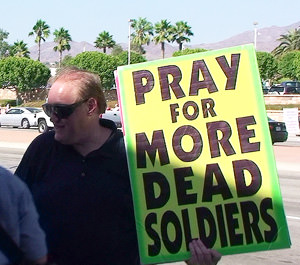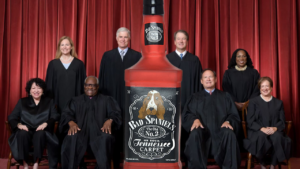Repulsive but Protected
I don't know if there's a hell, but if it exists, the Rev. Fred Phelps and other members of the Westboro Baptist Church deserve a place. In this world, their repulsive actions are shielded by the Constitution.
I don’t know if there’s a hell, but if it exists, the Rev. Fred Phelps and other members of the Westboro Baptist Church deserve a place. In this world, their repulsive actions are shielded by the Constitution.
Phelps and his Topeka, Kan., flock believe that “God is cursing America” — and killing U.S. soldiers — for assorted sins, including homosexuality, divorce and adultery. They have come up with a particularly offensive way of delivering their message: protesting at military funerals with signs such as “Thank God for Dead Soldiers” and “You’re Going to Hell.”
The church members protested outside the Westminster, Md., funeral of Marine Lance Cpl. Matthew Snyder, killed in Iraq in 2006, and followed up with an “epic” poem on the Web asserting that Snyder’s parents “raised him for the devil” and that “God rose up Matthew for the very purpose of striking him down.”
Snyder’s father, Albert, sued for intentional infliction of emotional distress and invasion of privacy. A jury awarded $11 million but a federal appeals court overturned the damages, ruling that the statements, while “utterly distasteful,” were protected by the First Amendment because they “involve matters of public concern.”
The Supreme Court heard Snyder’s appeal this week, and the justices seemed torn about how to resolve the case — or, perhaps more important, the implications of how they resolve it for other free speech cases.
“I’m looking for a line” that would allow damages in outrageous situations yet not “prevent somebody from getting out a public message,” Justice Stephen Breyer told the church’s lawyer, Margie Phelps, who is also the daughter of Fred Phelps.
“I fully accept you’re entitled in some circumstances to speak about any political issue you want,” added Justice Sonia Sotomayor. “But what’s the line between doing that and then personalizing it and creating hardship to an individual?”
I’m doubtful that line can be adequately drawn, which is why the appeals court was correct in throwing out the damage award. But I also think this case is less agonizing than meets the eye. The most appalling part of Westboro’s conduct is “hijacking solemn funeral proceedings for their own hateful purposes at the expense of grieving American families,” as a friend-of-the-court brief filed on Snyder’s behalf by the attorneys general of 48 states and the District of Columbia put it.
Yet there is another way to protect the sanctity of funerals and to shield grieving families than to sock protesters with million-dollar damage awards. Indeed, as the states themselves point out, the federal government and 46 states have enacted laws that regulate protests around funerals. The court has long permitted such “time, place and manner” restrictions as consistent with the First Amendment. The justices could easily throw out the damage award without threatening the viability of these statutes.
In fact, although Maryland’s law was not in place at the time, the Westboro protesters complied with police instructions about where to stand, several hundred feet from the funeral procession. From where he was, Snyder could see only the tops of the offending signs; he did not know what they said until he watched the television coverage several hours later. The service was not disrupted.
Indeed, the most hateful part of Westboro’s speech was the poem, with its individualized attack on Matthew Snyder and his parents. The most hateful — but also the most dangerous to expose to a damages claim. The document was posted a month after the funeral on the church’s website. Snyder found it surfing the Web.
If this speech is subject to punitive damages, what principle protects the offensive blogger or the outrageous commenter?
The court wrestled with a similar question in 1988, in a case involving Hustler magazine’s caricature of evangelist Jerry Falwell in a drunken, incestuous encounter with his mother in an outhouse. Could that depiction be punished without endangering traditional political cartoons?
“If it were possible by laying down a principled standard to separate the one from the other, public discourse would probably suffer little or no harm,” Chief Justice William Rehnquist wrote for the court. “But we doubt that there is any such standard.”
Albert Snyder is a more sympathetic figure than Falwell, and he was thrust into the limelight by tragedy, not by choice. But the court’s wisdom remains as true.
Ruth Marcus’ e-mail address is marcusr(at symbol)washpost.com.
© 2010, Washington Post Writers Group
Your support matters…Independent journalism is under threat and overshadowed by heavily funded mainstream media.
You can help level the playing field. Become a member.
Your tax-deductible contribution keeps us digging beneath the headlines to give you thought-provoking, investigative reporting and analysis that unearths what's really happening- without compromise.
Give today to support our courageous, independent journalists.






You need to be a supporter to comment.
There are currently no responses to this article.
Be the first to respond.